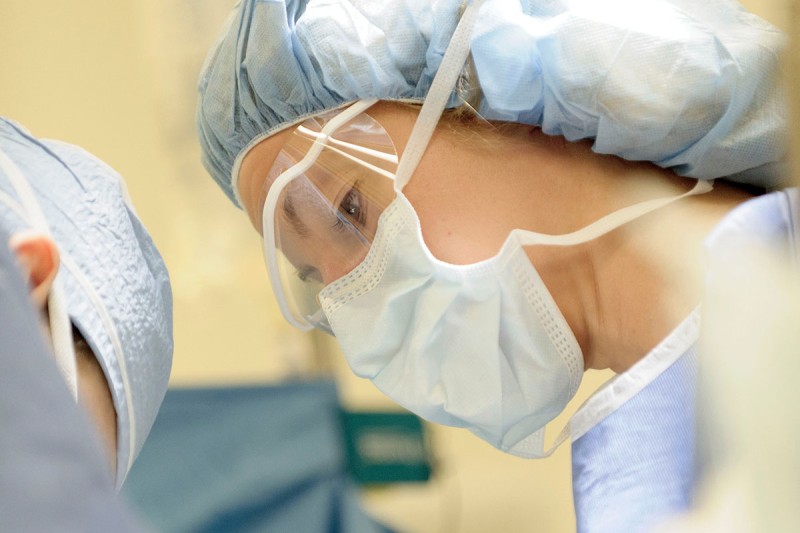
Signet ring cell cancer (SRCC) was detected in the vast majority of patients with CDH1 mutations following total gastrectomy, according to a study Memorial Sloan Kettering Cancer Center (MSK) physicians published in JAMA Surgery. (1)
With the increasing availability of genomic testing, more CDH1 mutations are being identified and referred for esophagogastroduodenoscopy (EGD). However, studies have shown that EGD biopsy finds SRCC in patients with CDH1 with ≤64% of patients that have the disease. Conversely, pathology analysis after performing a gastrectomy on patients with SRCC identifies the disease in 77% to 100% of patients.(3),(4)
Similar to other types of cancer, CDH1 mutations have also been linked to carcinomas in other organ systems. Male patients with the CDH1 mutation have a 70% risk to develop hereditary diffuse gastric cancer (HDGC), and female patients have a 56% chance of developing gastric carcinoma as well as a 42% risk of developing lobular breast cancer. (2) This presents the question: Should all patients with CDH1 mutations, with or without the added risk of family history of gastric cancer, receive total gastrectomies?

“The challenge is: How can we help patients who have a concerning genetic finding but don’t know how to stratify their risk is and what they should do,” says Vivian E. Strong, the lead author of the study and surgeon at MSK. “Even if you don’t have the family history but you have the mutation, there still is a real risk of developing invasive gastric cancer — but it appears lower than for patients with a family history. We want to have a more informed discussion about what the risks are and how to tailor the treatment approach.”
Key Study Findings and Implications
In this study, the research team enrolled 181 patients between 2006 and 2020 who have confirmed genetic germline variants of the CDH1 gene. All patients received an EGD that typically biopsied 25 sites in the stomach. All patients were then treated by a multidisciplinary team that included gastroenterologists, geneticists, nutritionists, a pathologist, surgeons, an oncologist, and the primary surgical team.
Of the 101 asymptomatic patients who underwent total gastrectomy, only 23 patients were diagnosed with SRCC during preoperative EGD. This highlights the importance of prophylactic gastrectomies because typical surveillance techniques, such as a biannual EGD, are not adequate in finding SRCC. Similar to many types of cancer, SRCC also has a strong genetic component. In patients with a family history of the disease, 89% were found to have SRCC. In this study, 4 of 6 of the patients who lacked a family history of SRCC had a history of lobular breast cancer.
Dr. Strong’s approach was both open surgery and minimally invasive surgery (MIS) using the da Vinci robotic system. It was shown that MIS allowed for the retrieval and pathology analysis of more lymph nodes compared with open surgery (P < 0.001), which leads to a more accurate diagnosis of the progression of the disease. Additionally, the average postoperative hospital stay was shorter in patients receiving MIS. With both surgical techniques, weight loss was 20% and there were only 3 anastomotic leaks out of 181 patients, reflecting that the procedure was effective and safe.
“A key component of the study design was focused on tailoring preoperative and postoperative planning to each individual patient,” said Dr. Strong, “We want to individualize treatment for each patient and their life circumstances.”
Clinical Trials Co-Investigated With Dr. Strong
- A Phase II Study of Pembrolizumab Immunotherapy plus Trastuzumab or Trastuzumab Alone after Surgery in Patients with Esophagogastric Tumors (NCT04510285)
- A Phase III Study of Durvalumab Immunotherapy and FLOT Chemotherapy Before and After Surgery in Patients with Operable Stomach and Gastroesophageal Junction Cancers (NCT04592913)
Learn more about MSK’s Department of Surgery and Minimally Invasive Surgery
Dr. Strong does not report and financial disclosures. Please refer to the publication for disclosures from the additional study authors.
Advancing Research Through Multidisciplinary Collaboration
MSK experts collaborated from the Departments of Surgery, Minimally Invasive Surgery, Gastroenterology, Pathology, Radiology, and Epidemiology and Biostatistics; the Center for Molecular Oncology; and the Human Oncology and Pathogenesis Program.
This study was supported in part by Cancer Center Support Grant P30 CA008748 from the National Institutes of Health/National Cancer Institute.

